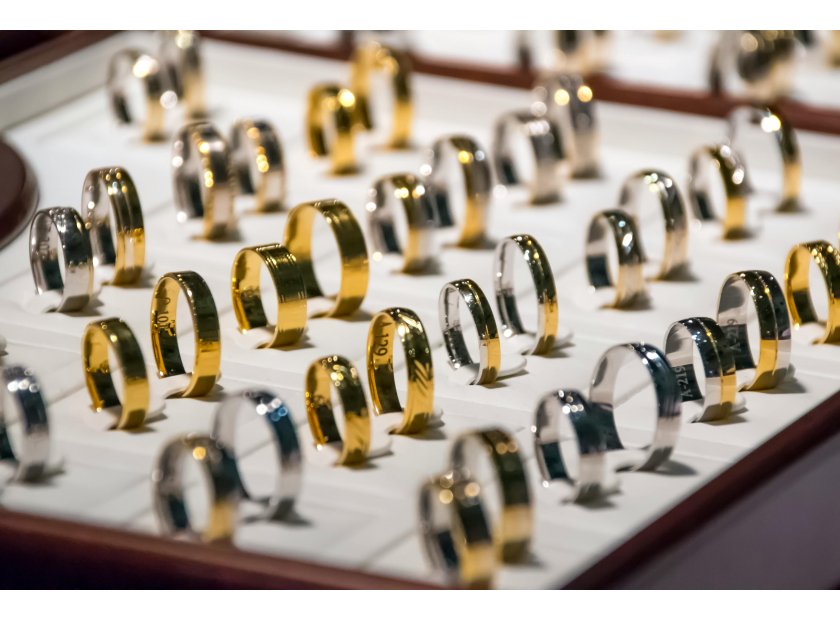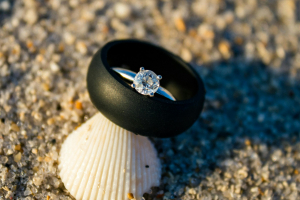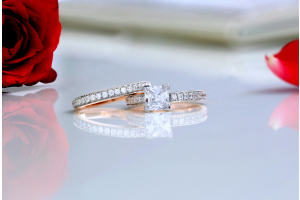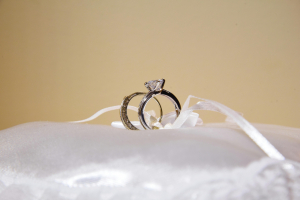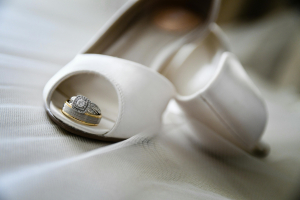GBP
/
GBP
/
Shipping to:
Currency:
How to Buy Engagement Rings Without Diamonds: The Ultimate Guide
When it comes to choosing an engagement ring, diamonds have long dominated the conversation. But more and more couples are breaking away from tradition, opting for alternatives that are every bit as beautiful and meaningful. Whether it's for ethical reasons, personal style, or budget considerations, engagement rings without diamonds are an appealing choice. Let’s explore how to find the perfect non-diamond engagement ring that symbolises your love and individuality.
Why Choose an Engagement Ring Without a Diamond?
Diamonds may be classic, but they’re not for everyone. There are plenty of reasons to go against the grain and select a non-diamond ring. For some, it’s about the cost; for others, it’s a desire for a more unique and personal expression. Ethical concerns around diamond mining also play a role, as many seek out more sustainable and conflict-free alternatives. Whatever your reason, there are countless stunning options available that will make a diamond-free engagement ring stand out.
Benefits of Choosing a Non-Diamond Engagement Ring
Opting for a non-diamond engagement ring comes with some significant advantages, making it a worthwhile consideration. Here are a few benefits you might not have thought about.
Cost-Effectiveness
Diamonds are known for their hefty price tags, and even smaller stones can stretch a budget. Non-diamond alternatives, however, often come at a fraction of the cost. This allows you to either save money or choose a larger, more impressive stone without breaking the bank. It’s a win-win!
Ethical and Sustainable Considerations
The diamond industry has a well-known history of ethical issues, including concerns about conflict diamonds. Many people prefer to avoid these by choosing alternative gemstones that are ethically sourced and sustainable. For a more sustainable choice, you can check out lab-grown diamonds, which are created in a controlled environment without the ethical concerns of traditional mining. This decision can add a layer of meaning to your ring, symbolising a commitment not only to your partner but also to responsible consumerism.
Unique and Personalised Style
Choosing a gemstone other than a diamond allows you to express a unique style. With so many options in terms of colours, shapes, and settings, a non-diamond ring can feel truly one-of-a-kind. If you’re interested in a touch of colour, explore fancy coloured diamonds, including stunning hues like blue, pink, and yellow, which make for a striking centrepiece. It’s a fantastic way to ensure your engagement ring stands out and reflects your personality.
Popular Alternatives to Diamond Engagement Rings
You don't have to settle for second best just because you're forgoing diamonds. Here are some popular alternatives that can rival the sparkle and elegance of any diamond.
Gemstone Options
Different gemstones offer a variety of colours and meanings, allowing you to choose one that resonates with you personally.
Sapphire
Sapphires aren’t just blue – they come in a range of shades, including pink, yellow, and green. Known for their durability and brilliance, sapphires are a popular choice for engagement rings. Blue sapphires symbolise loyalty and trust, making them a meaningful alternative to diamonds. For a more ethical approach, check out our lab-grown round diamonds as a stunning option that offers a similar sparkle.
Emerald
Emeralds are famous for their deep green colour, representing love and new beginnings. While they aren’t as hard as sapphires, they still make a striking centrepiece. Keep in mind that emeralds can be more prone to scratches, so choosing a protective setting like a bezel can help. If you’re considering an alternative to a traditional emerald, view our lab-grown emerald diamond options.
Ruby
For a passionate and bold choice, rubies are perfect. Their rich red hue is associated with love, energy, and strength. Rubies are nearly as durable as sapphires, making them suitable for everyday wear.
Moissanite
If you love the sparkle of diamonds but want a more affordable and ethical option, moissanite is worth considering. This gemstone is almost as hard as a diamond and reflects light brilliantly, offering a diamond-like appearance without the high cost.
Metal-Only Rings
Who says you need a gemstone at all? Simple metal bands can be just as stunning. Consider a minimalist engagement ring made from platinum, yellow gold, or rose gold. A high-quality metal with an elegant design can make a bold statement on its own.
Other Unique Stone Options
If you’re after something completely different, why not consider stones like opal, turquoise, or morganite? These gems come in unique colours and have distinct characteristics that make them stand out. While they may not be as hard as some traditional stones, choosing a durable setting can ensure their longevity.
Choosing the Right Metal for a Non-Diamond Engagement Ring
The choice of metal can make a significant difference to the appearance and durability of the ring.
Popular Metal Choices
Metals like platinum, yellow gold, white gold, and rose gold each offer a unique look. Platinum is highly durable and hypoallergenic, while rose gold adds a romantic touch with its warm hue. White gold is a classic choice that complements nearly any gemstone, while yellow gold gives a traditional and timeless feel.
Metal Durability and Maintenance
The hardness of the metal will determine how well it stands up to daily wear. Platinum, for example, is extremely durable but can develop a patina over time, while white gold needs to be re-plated occasionally to maintain its shine.
Pairing Metals with Coloured Gemstones
Certain metal tones work better with particular gemstone colours. For example, rose gold enhances the warmth of pink or red gemstones like morganite or ruby, while white metals like platinum or white gold look striking with cooler-toned stones such as sapphire.
Customising Your Non-Diamond Engagement Ring
Customisation can make an engagement ring feel even more special.
Adding Personalised Engravings
A thoughtful engraving on the inside of the band can be a sweet touch, adding sentimental value. This could be a significant date, initials, or a short meaningful phrase.
Designing a Unique Setting
The setting can significantly impact the ring’s overall appearance. Consider styles like halo, bezel, or vintage-inspired settings, which can add character and highlight the gemstone’s beauty. If you love unique shapes, explore our heart-shaped lab-grown diamond selection for a truly romantic touch.
Mixed Gemstone Designs
You don’t need to limit yourself to a single gemstone. Adding smaller accent stones can complement the central gem and create a beautiful contrast. For example, pairing sapphires with diamonds as side stones can achieve a classic yet distinctive look. To find the perfect mix, check out our cushion-cut lab-grown diamonds that can be paired with different accents.
Factors to Consider When Buying a Non-Diamond Engagement Ring
Before making your purchase, keep a few important factors in mind.
Gemstone Hardness and Durability
Gemstones are rated on the Mohs scale of hardness, which measures their resistance to scratches. For an engagement ring, which will likely be worn daily, you’ll want a gemstone with a Mohs rating of at least 7. Sapphire, ruby, and moissanite are all excellent choices for their durability.
Budget Planning
While non-diamond rings are generally more affordable, prices can still vary significantly. Make sure to set a budget and stick to it, considering both the gemstone and the metal.
Ethical Sourcing
Ethical sourcing isn’t limited to diamonds; it’s important to ensure that any gemstone you choose is responsibly sourced. Look for jewellers who prioritise ethical practices and transparency.
Where to Buy Engagement Rings Without Diamonds
There are several places to find stunning non-diamond engagement rings, both online and in person.
Online Retailers Specialising in Alternative Rings
Many online jewellers offer a wide selection of non-traditional engagement rings. Look for reputable retailers who provide detailed information about gemstone sourcing and ring materials.
Local Independent Jewellers
For a more personal shopping experience, consider visiting independent jewellers. You may find a unique piece or even commission a custom design.
Custom Ring Designers
If you have a specific vision for your ring, working with a bespoke jeweller can bring your idea to life. Custom designers can create a one-of-a-kind ring that matches your exact preferences.
Caring for Your Non-Diamond Engagement Ring
Proper care will ensure your ring stays beautiful for years to come.
Proper Cleaning Techniques
Different gemstones require different cleaning methods. Most can be cleaned with warm soapy water and a soft brush, but always check for any special requirements.
Regular Maintenance
Regularly inspect the ring for loose stones or signs of wear. If you notice any issues, take it to a professional jeweller for repairs.
Storing Your Ring
When not wearing the ring, store it in a jewellery box or soft pouch to prevent scratches and other damage.
Frequently Asked Questions
Are engagement rings without diamonds as valuable?
While non-diamond rings may not hold the same traditional value as diamond rings, their worth is more than just monetary. They can be just as precious, particularly when chosen for personal or ethical reasons.
What is the most durable non-diamond gemstone for an engagement ring?
Sapphires and rubies are among the most durable gemstones, with a Mohs hardness of 9, making them ideal for everyday wear.
How can I ensure that a coloured gemstone is ethically sourced?
Choose jewellers who are transparent about their sourcing practices and seek out certifications from reputable organisations like the Responsible Jewellery Council.
Do non-diamond engagement rings hold their value over time?
The value of non-diamond rings can vary depending on the rarity and quality of the gemstone. While they may not appreciate in the same way as diamonds, their sentimental and unique appeal often outweighs monetary considerations.


